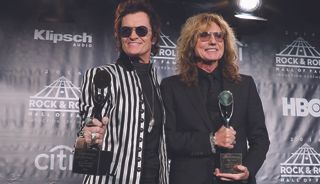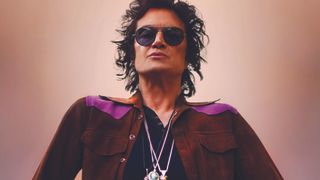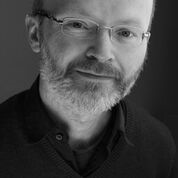He’s shared a house with Bowie, hung out with Jagger and has Hollywood stars as friends. He’s travelled the globe in private jets, performed on the world’s biggest stages, been christened the Voice Of Rock and inducted into the Rock And Roll Hall Of Fame. He’s also nearly drunk himself to death, had a heart attack thanks to drugs, and almost been shot for being in the wrong place at the wrong time. Life for the working-class lad from the Black Country was never quite the same again after he joined Deep Purple in 1973.
You Can’t Go Back Home
I’ve been living in LA for forty-three years. I’m so American now. I left my old home town, Cannock, in the Black Country, as pretty much a teenager. And that place is so far away from me now. Cannock did make me who I am. I’m from a working-class family. The only child. I got my work ethic from it. I was a studious student and a good athlete. And I surrounded myself with others that were the same breeding. I never missed a day of school. It was a great, loving childhood. But ten years ago I was walking in Cannock, dressed quite normally, and I was chased in the centre of town by two sets of youths in one hour. They were calling names, throwing bottles. I was so freaked out by their behaviour – these fifteen-year-old kids. That doesn’t happen in the United States, where I live. I was mortified that this happened in the town I was raised. I was disgusted. So I don’t walk around the town I was born in any more. It broke my heart.
I’ve Never Bowed Down To The God Of Money
I don’t do anything for monetary reasons. Not a thing. It’s your integrity you lose. When I joined Deep Purple, obviously the money was massive, and I was leaving my band Trapeze, where I was on maybe two-and-six a day [12½p]. But I joined Deep Purple to play with some virtuosos. I’ve never bowed to the God of money. If I did I’d have made a lot more. In my computer room I’ve got the seven deadly sins printed out in front of me – to beware of gluttony and lust, and greed. I live in LA and I meet a lot of producers, and I’m friends with a lot of actors, so I’ve had opportunities to do many, many sessions for lots of money, and reality TV shows that would’ve cast me in the wrong light. But it’s got to be the right thing for me.

David Bowie Was A Great Housemate
He was full-on. Let’s just say we had some shenanigans going on, and we were experimenting. He took five days coming out on a train from New York – alone. This is David Bowie in 1973, when he’s had a Number One album only a few months before. And he’s at my house alone, and nobody in the world knew where he was except me, my manager and assistants, and the guys in Purple. And I got to see him write the entire Station To Station album. He cut my hair and threw away all my Kensington Market Mexican boots and bell-bottoms. I had to go buy new clothes. He gave me some of his, too. I was the one in Purple David navigated to, and we went off together. Although Ritchie did not want me to sing on Young Americans, so I didn’t. Who did the dishes? There wasn’t a lot going on in the kitchen. He used to bark at me, daily: “Hughesy, you’ve gotta keep changing! You can’t keep doing the same thing, you’ve gotta reinvent.” “Listen to Nina Simone,” he’d always say. When he passed away it was him saying that that I distinctly remember – that you’ve got to keep listening to other things than what you think you should be listening to. Because he always did.
Being A Rock Star In The Seventies Was Normal Life For Me
Deep Purple were a massive, massive band. You get caught up in the massiveness of it. Private jets, and everybody had their own limo, and the roadies had roadies. I’d been with them a couple of years when I started hanging out with people like Jagger. Songs defined a rock star back then, before drum risers and lasers. And what defined stardom for me with those guys was the uniqueness of their artistry. So when you’re cast into a league of that calibre you blend in. Listen, I’m a huge Stones fan, and huge fan of Bowie and Eric Clapton and John Bonham, who I used to hang out with. But I wasn’t fanboy-ish, I was just in there, and talking, and we were asking each other a lot of questions about life. Just normal behaviour, really. If I’m in a mirror and standing next to Bowie and Jagger, with my hair down to my waist, with these two hip-slick guys, maybe wearing some lipstick, it must have looked weird. But it wasn’t. It was quite normal, actually.
Don’t Play A Gig During A Military Invasion
There’s a movie being made about when my bodyguard, Patsy Collins, was killed in Jakarta, Indonesia in 1975. That was not an easy experience for me. I remember these guerrilla-type cops breaking down my hotel door and dragging me off. I was barefoot, with just my jeans and T-shirt. They threw me in a van alongside my assistant, other bodyguard and the tour manager. We were told nothing, and we were thrown in a jail with hay on the floor. It was like a movie, and the movie was Midnight Express. The guy who was holding us captive was an Idi Amin-looking fellow. He was playing Russian roulette with a gun, spinning it on the table, joking with me and these three other Limey guys, like: who is he going to shoot first? And then we heard that Patsy had died. We didn’t know how at first. He fell seven floors, landed on the pipes at the bottom, and crawled to the front desk and died. I was given one of his sneakers. Yeah, we were a pretty rowdy bunch of kids back then. But Jakarta went to war on East Timor that same day, and five Australian journalists were killed there. We thought we were going to die. It could have been me that died. Whoever walked through my door at that hour, it must have been one or two am, was going to die. It was a nightmare.
The Show Must Go On
Purple had already played the one show in Jakarta in 1975, and they let me out of jail to play the second one. There was a guy standing by my amps with a machine gun pointed at me, in case I ran off stage. Fucking unreal. We didn’t play for long. I was literally in a state of shock. But we had to finish the tour. And [Purple guitarist] Tommy Bolin had been given a lethal dose of some opiate and fallen asleep on his hand, so he was out for the count to go play those last five shows in Japan.
It was very, very difficult to continue that tour, without Patsy. I was so young to have that happen to. To be a bodyguard and to protect his artist was all Patsy Collins wanted to do. But to then have lost his life is something I could never explain.
- Glenn Hughes: I never fell out with Joe Bonamassa
- Glenn Hughes: Resonate is my most grounded rock album
- Glenn Hughes streams new track Let It Shine
- Glenn Hughes issues Heavy video starring Chili Pepper Chad
Somebody Up There Likes Me
I had some horrible times when I was drinking. Right before I got sober, I fell asleep while frying some bacon or something, and the kitchen caught on fire and my house burned down. I almost died, and I got all burned up on my legs. There’s so many things that happened to me when I was in my addiction. I almost drowned, there were car crashes… I don’t care what people think when I say this, but it’s almost as if God or a guardian angel has been with me through it all. People have no idea what I’ve been through. I’ve survived so many weird incidents and come through it.
Open-Heart Surgery Sobers You Up
I had a heart attack on Christmas Day in ninety-one. God obviously had a sense of humour: “Let’s see if he’s paying attention – kapow!” He gave me the heart attack. Or something did – well, that would have been the drugs, wouldn’t it? I realised how close to death I was then. I knew I had to get in a car, and my girlfriend drove me to hospital. And I very distinctly said to them at the hospital: “I’ve OD’d.” And then I blacked out. I woke up, and I’d been sober for twenty-four hours. Which was a great moment for me, because I’d been trying for years. I was an embarrassment to myself. I never really went out in public. I lived in Laurel Canyon [in California] for two years and never really left. I used to get my food from the Country Store down the hill. I was kind of a hermit. Pretty sad.

Being In The Rock And Roll Hall Of Fame Is Important To Me
If you’re American, which I pretty much am, the Hall Of Fame is a big thing – in baseball, football, basketball, the Oscars. In America it signifies that you’ve made it. So to be inducted with your classmates – Zeppelin and the Stones and U2 – is a huge thing. It’s also a huge thing for David Coverdale and myself to be inducted alongside the other guys in Deep Purple. I think that our contribution on the Burn album was a significant enough surge for the Hall Of Fame committee to vote us in. David and I are as close as you can get as friends. Since the band broke up, he’s the only one I’ve had any constant relations with. I have no idea what the other guys have done. I did befriend Jon Lord a couple of years before he died. I have no relationship with anyone else in the band.
I’m A Messenger Of Love
Over the last twenty-five sober years, I’ve been carrying the message: love is the answer. You can call me a hippie twenty-four-seven. I may not look like one, but I’m from the sixties, and that’s the way it is. I come from a really great family, I have a great family here in LA, and I surround myself with love. I have no time for loud, envious, miserable, disruptive people. My business is to stay calm, do the next indicated thing and relax. I’m on my knees praying quite a lot. I’ve never really done anything inappropriate, except drugs. I’ve never been a complete womaniser. I’ve never been a cheat. I’ve been a liar and a thief, drinking. But I can’t fix that guy who was pathetic, that guy who was in the fire. I can only work on the guy who’s living and breathing inside of me now. I’ve made amends to those I need to. I live on the right side of the grass.
Glenn Hughes: My year of living dangerously with David Bowie


